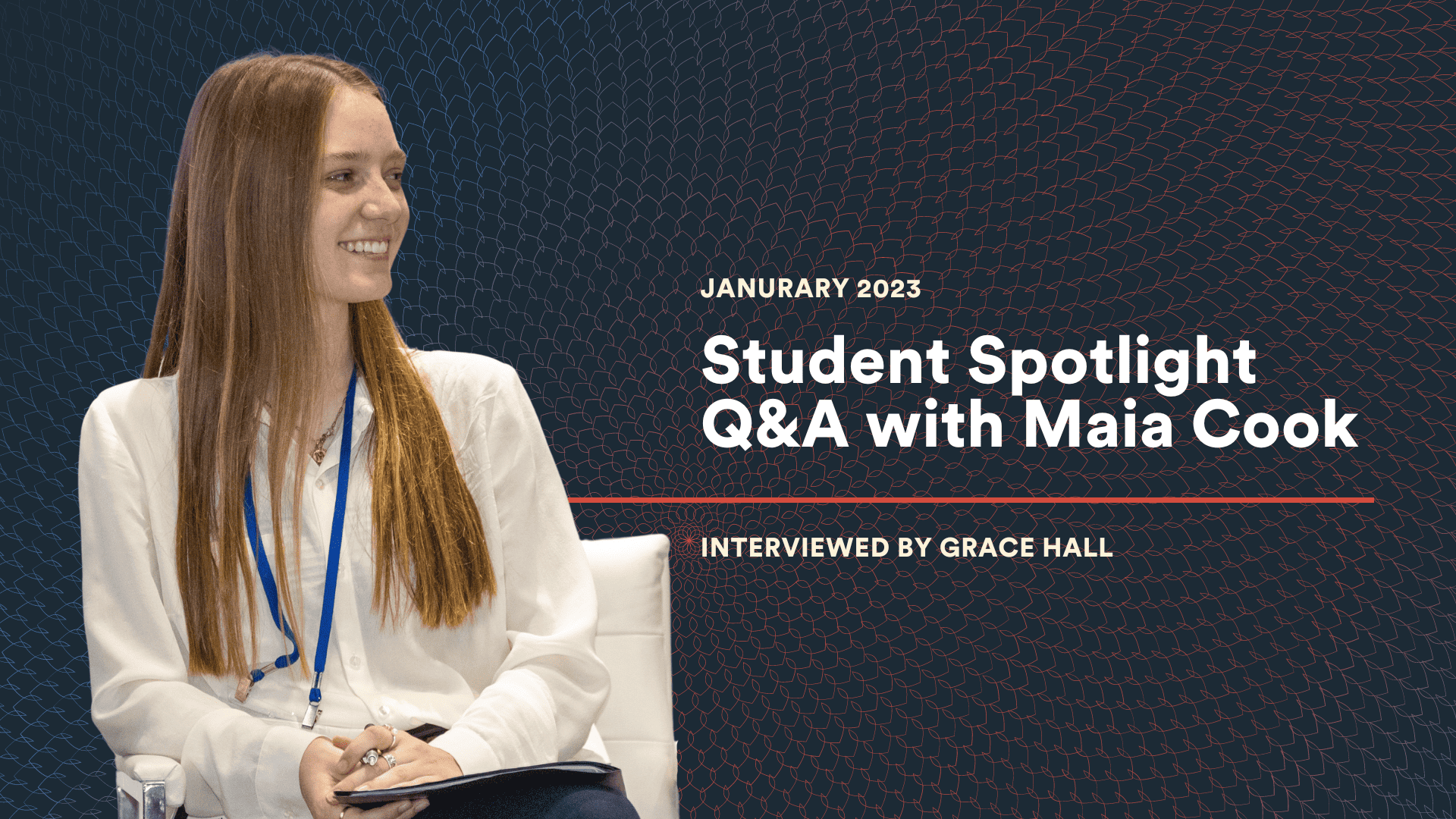In this interview, Young Americans Network Coordinator Grace Hall is joined by Maia Cook, a Yale University student and activist, to discuss the role of young people in getting money out of politics.
Can you start by telling me a little bit about yourself?
My name is Maia, I am 20 years old, I am a junior attending Yale University, and I study ethics, politics, and economics as my major. I am originally from Kentucky, but I grew up in Barcelona and California.
Getting money out of politics isn’t necessarily an issue that many young people are passionate about. How did you first become interested in campaign finance reform?
I first became interested in campaign finance reform in high school. I participated in a lot of different debate programs and one of the prompts for my conference was debating overturning Supreme Court decisions like Citizens United, Speech Now, and Buckley v. Valeo, etc. So, I had to debate this topic for a conference, and to me, it felt like such a Herculean task. The idea of creating, writing, and passing a constitutional amendment did not feel possible. I ended up winning my debate because students believed that not only is it necessary, it’s possible to create a constitutional amendment that will get big money out of politics.
So that’s how I first became interested in money in politics and campaign finance reform. Later, when my AP Government class was learning about monumental Supreme Court decisions, like Citizens United, they weren’t explained very clearly. I ended up feeling very confused about the misnomer of Citizens United. I thought “How can it unite citizens if it’s a bad thing?”. So, I started talking to strangers online and asking people “What’s so bad about Citizens United?” and “Why should money be considered political speech?”. To me, that wasn’t intuitive. I couldn’t get a straightforward answer, and I think that’s why I’ve spent so much time thinking about it. If it was a straightforward answer, I wouldn’t still be here thinking about campaign finance reform.
For our generation, the Citizens United decision wasn’t something that was really on our radar since we were children at the time. In your opinion, why is getting rid of corruption and dark money in our political system so important for young people especially?
I think that it’s an important issue for us because once the next couple of generations of Congress are phased out, it will be our turn to step up. We’ll become the decision-makers. So, if we can get dark money and corruption out of our political system now, then once we rise to Congress we can have people of integrity making decisions that will take care of underrepresented populations in America. That’s not something that we can have in a system that champions dark money and elite interests.
Like you said, it’s not an issue of if, but when. Either we tackle this now, or we’ll still be dealing with the impact of dark money when our generation is in power.
One thing I will add is that earlier you said that “getting money out of politics isn’t necessarily an issue that many young people are passionate about”. I just want to touch on that because I think that it is, but just not under that name. When young people talk about, for instance, the price of insulin, and that being too high, they’re talking about money in politics. When people our age call DC a swamp, they’re talking about money in politics. So, even though most people our age aren’t having direct conversations about these court cases, we still are having conversations about money in politics. It’s like an invisible string that ties together a lot of young people across the political spectrum. Since so many young people do care about this issue, I do think it’s something that we can actually get rid of. It’s important for us to get involved now. We need a government that champions popular sovereignty over elite interests.
That’s such a great point because it’s something that you just can’t escape. It’s an undercurrent of so many different issues. This leads me to my next question, which is: what is one issue that you would like to address with the passage of the For Our Freedom Amendment?
Personally, I am interested in the pharmaceutical industry. This past summer, I was an intern at Open Secrets, which is the nation’s leading nonpartisan think tank that collects data on money in politics. I was responsible for combing through a lot of our data, and it seemed like every other cell in my spreadsheet was related to the pharmaceutical industry or an independent expenditure from a pharmaceutical company. The pharmaceutical industry is ranked number one in nearly every lobbying quarter. That to me is really scary. There’s no reason why healthcare should be this expensive in the U.S., so getting money out of politics would definitely make access to health services and medicine easier for people who have been left out of government as a result of the protection of corporate interests by these Supreme Court cases.
I’m sure that was a really interesting internship to have.
It was! It was eye-opening but a lot of things that I was reading and working with weren’t really surprising. It’s very frustrating to see who is really in charge of our government.
You spoke on a panel with Jeff Clements, the CEO of American Promise, as well as other experts in the field of constitutional reform at the American Democracy Summit this past September. Why is it so important to you to be vocal about this issue?
It’s important to me to be vocal about this issue because most people don’t recognize it as the root of discontent with our democracy. If they only knew what was really causing our current situation, then maybe we could have better conversations about reclaiming our government. It’s also important to me because a lot of people think that they are voiceless or drowned out by sectional interests, or that their Congress people will defect from their preferences and vote in ways that are harmful to their communities. If we get money out of politics then we can change this narrative and one day have a government that acts in the interest of their constituencies. This is why it’s important to have these conversations and to represent my generation. I want to show that we will stand up for what is right and that we are engaged and active and excited to become the changemakers for the future. I was grateful to have the opportunity to represent our generation at the American Democracy Summit. It was such a great experience and so much fun.
Do you have any advice for other students or young people who would like to be an outspoken advocate for the issues that they’re passionate about, but have some misgivings about going outside of their comfort zone or starting important conversations in their communities?
Being an advocate for anything that you believe in doesn’t require you to be outspoken in the literal sense. There’s so much that you can do without having to directly have conversations or be on stage, which is something that I enjoy doing. Wield your pencil like a sword. Go out and write op-eds, write to your representatives, and start conversations that way if you aren’t comfortable with public speaking. It’s important to talk to people who actually matter and who might listen to the things that you’re saying rather than getting into petty fights with strangers on the internet. If you want to get involved, figure out who has a voice in the issues that you care about. For example, consider the people who were involved in the Supreme Court decisions that you find problematic, and try to have a conversation with them. I have done this by reaching out to Floyd Abrams, who represented Mitch McConnell in the Citizens United decision, and I had an excellent conversation with him about why money in politics is dangerous. He actually made some incredibly admirable concessions on this point, so I think this goes to show why civil discourse is important and how having conversations can be a powerful tool of advocacy.
There is a role for everyone who is passionate about this issue to play. No matter what your strengths are, anything that you can contribute helps the movement in a big way. What are some resources that you would recommend to your peers if they’re looking to learn more about campaign finance reform and the fight to enact a constitutional solution?
The first resource that I would suggest is an article from the Brennan Center for Justice called “Citizens United Explained” by Tim Lau. It’s an accessible piece of literature that explains why money in politics can be a form of corruption and why it’s dangerous for all citizens. Another resource is Open Secrets’ “Money in Politics Timeline”. This is an excellent review of the last 200 years of money in politics. If you’re interested in taking a look at both sides of the Citizens United debate, one great resource is the video of a Brown University event hosted in 2010 with Lawrence Lessig and Bradley Smith called “Free Speech? Citizens United v. FEC Revisited”. I watched this initially in high school and I believe that watching this was one of the most consequential things I’ve done in my life. This is another accessible and easy-to-understand resource, and Lessig does a great job explaining the dangers of plutocracy. If you’re looking to do a deep dive on Citizens United, check out the short summaries of the cases found on Oyez.org.
Additionally, if people are looking to find out what comes next, they can check out the American Promise website for information on the For Our Freedom Amendment and our constitutional solution to this issue.
Most people think an amendment is impossible, but when you actually start talking to them, it doesn’t seem like such a huge task. It’s a really exciting thing.
You’ve said previously that you believe that “apathy and the idea that we are too young to do anything meaningful” is a barrier to young people getting involved in politics. What would you say to our fellow young people as a call to action?
The most important thing that young people can do is to educate themselves. When you make yourself an expert in anything that you’re passionate about, then you will be prepared to take on high-level conversations with adults and real-world experts. That will give you a voice in the conversation. Check out the resources on money in politics that I suggested if you’re looking for a place to get started.
Thank you so much for joining me in this conversation, Maia. You’re doing really important work and we’re so glad to have you involved with American Promise.






